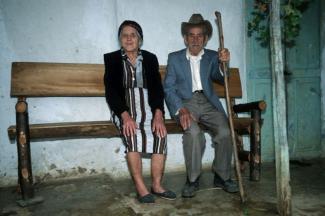Research
More than a lack of money

For various reasons, experts who assess poverty should consider subjective criteria such as “happiness” and “life satisfaction” on top of objective living standards. What basic needs must be met for a decent standard of living may diverge from one region to another, depending on individual perceptions as well as the value system of the society in question. Moreover, the methods commonly used to measure living standards – for example in the UN Human Development Index (HDI) – are always incomplete. Choice, weighting and aggregation of indicators are necessarily open to debate.
Defining happiness
One issue at the heart of the debate is how to define happiness. There is no generally accepted definition. In fact, happiness is a subjective experience, so personal preferences determine what exactly contributes to making life a happy one. Though the terms are often used as synonyms, a fundamental distinction needs to be made between “happiness” and “life satisfaction”. “Happiness” is a momentary, impermanent sense of joy or pleasure, whereas “life satisfaction” is a memory-based assessment of a person’s life as a whole.
Happiness researchers have set their sights on explaining the factors that determine happiness. By and large, they agree on the major parameters. Basically, a distinction can be made between “external” and “personal” factors. The external ones include economic variables such as income, employment (availability of work and quality of working conditions) and inequality, but also social aspects such as inclusion or civil liberties. Political aspects such as form of governance and corruption may be relevant too. The personal factors include things such as health (physical and mental), family environment (partnership and presence of children), demographic aspects (gender and age) and a person’s level of education.
No causal relationship between poverty and happiness
Development research should consider the empirical links between poverty and happiness. By intuition it is assumed that poverty and happiness must have a strong negative correlation. In actual fact, however, there are contrary findings, known as the “Easterlin paradox” (Easterlin, 2001): While people living in more developed countries tend to be happier than people in less developed countries at a given time, happiness within a country does not rise over time even as development progresses.
Two explanations are offered for this phenomenon. The first is that people focus on social comparisons and thus often value relative prosperity more than absolute prosperity. This underlines the great importance of inequality and social cohesion in a society. The second explanation is that the interrelatedness of prosperity, happiness and personal expectations changes over time. When incomes rise, so do expectations. In consequence, people’s sense of well-being is diminished if – or for as long as – their new expectations are not met.
Generally speaking, a certain variation between prosperity and happiness seems obvious. The reason is that, although the two phenomena have common determinants, they are inherently and fundamentally different. There is no causal relationship between prosperity and happiness. It is thus all the more important to consider subjective well-being in the ongoing discussion of development objectives.
The following example illustrates the issue well: life expectancy is a widely used indicator of health and living conditions within a country. Therefore, one might assume that a lower life expectancy in a country implies a greater degree of poverty and thus a lower level of happiness. However, international comparisons that contrast “life expectancy” with “happy life years” (Veenhoven, 2004) show that this is not necessarily the case.
While some countries have comparable data with respect to average life expectancy, they show great variations in terms of “happy life years”. Likewise, some countries differ vastly in average life expectancy, their data concerning “happy life years” are similar. A fundamental assessment of the results is very hard to make. It seems arbitrary to say that a longer but on average unhappier life is better than a shorter but happier one, or vice versa.
These comparisons also illustrate how much the choice and concept of indicators matters for international assessments of a country’s quality of life. No single indicator or aggregated set of indicators will perfectly reflect multidimensional reality completely. The phenomenon is better understood if one considers various factors simultaneously. No doubt, it is essential to include subjective perspectives in future debates.
Sebastian Rewerski is junior policy adviser at GIZ. He is expressing his personal views in this essay.
sebastian.rewerski@hotmail.com
References
Easterlin, R. A., 2001: Income and happiness: Towards a unified theory. The Economic Journal. Vol. 111, pp. 465-484.
Veenhoven, R., 2004: Happy life years.
https://personal.eur.nl/fsw/research/veenhoven/Pub2000s/2004b-full.pdf













